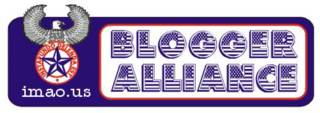Maries Two Cents
Far Right Conservative And Proud Of It!..... Stories That I Think Need Special Attention, And, Of Course, My Two Cents :-)
About Me

- Name: Marie's Two Cents
- Location: Del City, Oklahoma, United States




| RepublicanGOP.com The Ring of Republican Websites Ring Owner: Republicans Site: republicangop.com/ - The Ring of Republican Websites |
||||
 |
 |
 |
 |
 |
 |
||||






























16 Comments:
I watched this live, Marie. She done good! :)
Off topic: I'm doing a bit better and have posted an update.
Thanks for posting these videos, Marie. I don't watch much TV, but thanks to you, I was able to see Gov. Palin's TV interview debut.
I also thank you for posting the videos, Marie. Sarah held her own against an antagonistic interviewer. The Dems must be really scared now!
thanks for posting these video's. keep it up...
kw
Great site you got!
Would you like a Link Exchange with my site COMMON CENTS? Check it out....
http://www.commoncts.blogspot.com
Steve
I didn't get a chance to see the whole interview yet. I heard our girl did good. Sarah should have to answer tough questions as long as they are asked fairly and the interviewr doesn't try to sandbag her with obscure questions that no one would know.
McCain went on the View and the first thing from fat ass Bahar was "You're campaign ads are lies".
I would have asked her how could she possibly know that? Her fat ass hasn't been away from the buffet bar long enough to know what the truth is.
Charlie Gibson is an example of why women will come out in droves to vote for the McCain Palen ticket.
Well I hope you guy's are enjoying these Video's :-)
I will visit all my new friends over the weekend :-)
You know, one thing I have been wondering?
Could Charlie Gibson have gotten any closer to this poor woman? lol
Yeah, "obscure" questions like, "How is your economic policy platform different than George Bush's?" ("reform governmental agencies" ---brilliant!) or "Do you agree with the Bush Doctrine?" (ooops...wasn't aware she didn't know what the Bush Doctrine is).
(CNN) – Sarah Palin did not visit troops in Iraq, a spokesperson for the Republican VP nominee confirmed Saturday, as new details emerged about the extent of the Alaska governor’s foreign travel.
In July of last year, Palin left North America for the first time to visit Alaskan troops stationed in Kuwait. Palin officials originally said her itinerary included U.S. military installations or outposts in Germany and Kuwait, and that she had visited Ireland. An Alaska spokeswoman for Palin had said Iraq was also one of the stops on that trip.
The Boston Globe reported Saturday that Palin visited the Iraqi side of a border crossing — but never journeyed past the checkpoint.
Earlier: McCain defends Palin's experience level
Earlier, campaign aides confirmed reports that Palin’s time in Ireland on that trip had actually been a re-fueling stop.
DOES THIS CAMPAIGN EVER TELL THE TRUTH? IS HER NAME TRULY "SARAH PALIN"?
D-E-S-P-E-R-A-T-I-O-N !
No time for the issues Grampy...hide behind Sarah and just do character attack ads! Americans are too stupid, right?
The debates can't come soon enough. That's one place where for at least 90 minutes, McSame and Pa(l)in can't hide.
But to her defense: she has been to Mexico and Canada. That's foreign policy experience, right?
Gibson and ABC buthered the interviews with editing. Go here for excised portions. The restored words change the flavor.
"Do you agree with the Bush Doctrine?" (ooops...wasn't aware she didn't know what the Bush Doctrine is).
In what respect, feddie? (~_^)
What is the Bush Doctrine, Federalist?
Wordsmith:
Unilateral foreign policy (you're either with us or against us), imperialism (we know what's best for you and we're coming to show you in the form of an occupation) and preemptive war (who needs real evidence when you have God on your side?).
What does Bush say the "Bush Doctrine" is?
Spreading democracy, ending terrorism (good luck with that one) and replacing governments/leaders who appear to be a threat to the U.S., even when they clearly are not a threat (Iraq).
I just prefer the shorter version provided by PNAC.
I think we've had this discussion before Wordsmith. I don't believe you'll ever convince me that imperialism is a good idea in 2008 and beyond.
The ironic thing about the Bush Doctrine was when Bush said, "We will make no distinction between terrorists and countries that harbor them."
With that said, why does George he still kiss and hold hands with that king of Saudi Arabia?
Well, Wordsmith, it's not surprising that nobody seems able to say exactly what the Bush Doctrine is. Wikipedia tells us that there are no fewer than six versions:
"It may be viewed as a set of several related foreign policy principles, including stress on ending terrorism, spreading democracy,[1] increased unilateralism in foreign policy[1] and an expanded view of American national security interests. Foreign policy experts argue over the meaning of the term "Bush Doctrine," and some scholars have suggested that there is no one unified theory underlying Bush's foreign policy. Jacob Weisberg identifies six successive "Bush Doctrines" in his book The Bush Tragedy,[2] while former Bush staffer Peter D. Feaver has counted seven.[3] "
The whole article lives here:
http://en.wikipedia.org/wiki/Bush_doctrine
If you have any clear idea of what Mr. Gibson was asking after you've read the article, let me know.
But that's the nice thing about these policy questions, if you're a progressive/leftist. You can define it to mean whatever you ant it to mean, and your friends will love you and hate your enemies.
pavian and fed, that's the whole point: there is no "official" one version/explanation of the Bush Doctrine.
Krauthammer, who coined the term:
The New York Times got it wrong. And Charlie Gibson got it wrong.
There is no single meaning of the Bush doctrine. In fact, there have been four distinct meanings, each one succeeding another over the eight years of this administration — and the one Charlie Gibson cited is not the one in common usage today. It is utterly different.
~~~
…I was the first to use the term. In the cover essay of the June 4, 2001, issue of the Weekly Standard entitled, “The Bush Doctrine: ABM, Kyoto, and the New American Unilateralism,” I suggested that the Bush administration policies of unilaterally withdrawing from the ABM treaty and rejecting the Kyoto protocol, together with others, amounted to a radical change in foreign policy that should be called the Bush doctrine.
Then came 9/11, and that notion was immediately superseded by the advent of the war on terror. In his address to the joint session of Congress nine days after 9/11, President Bush declared: “Either you are with us or you are with the terrorists. From this day forward any nation that continues to harbor or support terrorism will be regarded by the United States as a hostile regime.” This “with us or against us” policy regarding terror — first deployed against Pakistan when Secretary of State Colin Powell gave President Musharraf that seven-point ultimatum to end support for the Taliban and support our attack on Afghanistan — became the essence of the Bush doctrine.
Until Iraq. A year later, when the Iraq war was looming, Bush offered his major justification by enunciating a doctrine of preemptive war. This is the one Charlie Gibson thinks is the Bush doctrine.
It’s not. It’s the third in a series and was superseded by the fourth and current definition of the Bush doctrine, the most sweeping formulation of the Bush approach to foreign policy and the one that most clearly and distinctively defines the Bush years: the idea that the fundamental mission of American foreign policy is to spread democracy throughout the world. It was most dramatically enunciated in Bush’s second inaugural address: “The survival of liberty in our land increasingly depends on the success of liberty in other lands. The best hope for peace in our world is the expansion of freedom in all the world.”
~~~
If I were in any public foreign policy debate today, and my adversary were to raise the Bush doctrine, both I and the audience would assume — unless my interlocutor annotated the reference otherwise — that he was speaking about the grandly proclaimed (and widely attacked) freedom agenda of the Bush administration.
Not the Gibson doctrine of preemption.
Not the “with us or against us” no-neutrality-is-permitted policy of the immediate post-9/11 days.
Not the unilateralism that characterized the pre-9/11 first year of the Bush administration.
Presidential doctrines are inherently malleable and difficult to define. The only fixed “doctrines” in American history are the Monroe and the Truman doctrines which come out of single presidential statements during administrations where there were few other contradictory or conflicting foreign policy crosscurrents.
Such is not the case with the Bush doctrine.
Excellent analysis by Joshua S. Treviño:
The consequence of this exchange has been the predictable and familiar litany of hand-wringing over Palin’s purported ignorance of basic foreign policy principles, and her concurrent fitness (or lack thereof) to lead the country. See Andrew Sullivan for a succinct demonstration of the shrieking; the rest may be found via the usual suspects.
Sullivan writes: “[A]ny serious person who has followed the debates about US foreign policy knows what the Bush doctrine is.” Charlie Gibson apparently agrees. They’re both wrong. The fact is that the “Bush Doctrine” is a term which has had an evolving definition over this decade. Though it’s obvious Palin was momentarily baffled by the query, she was far closer to the truth when she interpreted the phrase as signifying the President’s “world view.” What we know as the “Bush Doctrine” has many meanings. A brief survey reveals the following:
In March 2002, the New York Times’s Frank Rich described the “Bush Doctrine” as the proposition, enunciated by the President, that “any nation that continues to harbor or support terrorism will be regarded by the United States as a hostile regime.”
In March 2002, UK Guardian’s Tony Dodge declared that the “Bush Doctrine” was a set of American-imposed principles for the conduct of small states, “concern[ing] the suppression of all terrorist activity on their territory, the transparency of banking and trade arrangements, and the disavowal of weapons of mass destruction.”
In January 2003, Thomas Donnelly of the American Enterprise Institute defined the “Bush Doctrine” as a principle of American global hegemony, with “anticipatory self-defense” as one of its enforcement mechanisms.
In February 2003, PBS’s Frontline’s “The War Behind Closed Doors” described the “Bush Doctrine” as the whole set of premises undergirding the 2002 National Security Strategy — of which “anticipatory self-defense” is merely one facet. In March 2003
, Slate’s Michael Kinsley put a unique spin on the “Bush Doctrine,” by asserting it signified the President’s claimed right to go to war without permission from international or domestic institutions.
In June 2004, the Washington Post’s Robin Wright wrote that the “Bush Doctrine” was comprised of “four broad principles,” of which “anticipatory self-defense” was only one.
In March 2005, Charles Krauthammer, in Time, described the “Bush Doctrine” as encompassing the policy of democracy-promotion in the Middle East.
In December 2006, Philips H. Gordon of the Brookings Institution defined the “Bush Doctrine” as encompassing a set of four basic assumptions, of which “anticipatory self-defense” was half of one.
In June 2007, Ali Abunimah of the Electronic Intifada referred to the “Bush Doctrine” as the principle of democratization in the Middle East.
In July 2007, Senator Barack Obama described the “Bush Doctrine” as, as reported by ABC News, “only speaking to leaders of rogue nations if they first meet conditions laid out by the United States.”
In January 2008 and in May 2008, Jeff Jacoby of the Boston Globe described the “Bush Doctrine” as the President’s warning to “the sponsors of violent jihad: ‘You are either with us, or you are with the terrorists.’”
Two things to note: first, that “any serious person who has followed the debates about US foreign policy” should know that describing the “Bush Doctrine” as the President’s “world view” is actually rather apt; second, that even the Democratic nominee for president botches the definition by the Gibson standard. Logically, those denouncing Palin for unfitness to be vice president now, on these grounds, ought to be doubly concerned that Barack Obama is unfit to be president. This won’t happen, of course, because this entire affair is a passing tactical “gotcha” rather than a serious critique.
There’s a lot more where this came from — see Richard Starr’s epic catalogue of ABC’s own variations on the term’s definition — but this is sufficient evidence to demonstrate that Charlie Gibson and Palin’s critics got it wrong. Sarah Palin got it right
Here is the Unedited transcript of the Bush Doctrine question:
GIBSON: Do you agree with the Bush doctrine?
PALIN: In what respect, Charlie?
GIBSON: The Bush — well, what do you — what do you interpret it to be?
PALIN: His world view.
GIBSON: No, the Bush doctrine, enunciated September 2002, before the Iraq war.
PALIN: I believe that what President Bush has attempted to do is rid this world of Islamic extremism, terrorists who are hell bent on destroying our nation. There have been blunders along the way, though. There have been mistakes made. And with new leadership, and that’s the beauty of American elections, of course, and democracy, is with new leadership comes opportunity to do things better.
GIBSON: The Bush doctrine, as I understand it, is that we have the right of anticipatory self-defense, that we have the right to a preemptive strike against any other country that we think is going to attack us. Do you agree with that?
PALIN: I agree that a president’s job, when they swear in their oath to uphold our Constitution, their top priority is to defend the United States of America.
I know that John McCain will do that and I, as his vice president, families we are blessed with that vote of the American people and are elected to serve and are sworn in on January 20, that will be our top priority is to defend the American people.
GIBSON: Do we have a right to anticipatory self-defense? Do we have a right to make a preemptive strike again another country if we feel that country might strike us?
PALIN: Charlie, if there is legitimate and enough intelligence that tells us that a strike is imminent against American people, we have every right to defend our country. In fact, the president has the obligation, the duty to defend.
GIBSON: Do we have the right to be making cross-border attacks into Pakistan from Afghanistan, with or without the approval of the Pakistani government?
PALIN: Now, as for our right to invade, we’re going to work with these countries, building new relationships, working with existing allies, but forging new, also, in order to, Charlie, get to a point in this world where war is not going to be a first option. In fact, war has got to be, a military strike, a last option.
GIBSON: But, Governor, I’m asking you: We have the right, in your mind, to go across the border with or without the approval of the Pakistani government.
PALIN: In order to stop Islamic extremists, those terrorists who would seek to destroy America and our allies, we must do whatever it takes and we must not blink, Charlie, in making those tough decisions of where we go and even who we target.
GIBSON: And let me finish with this. I got lost in a blizzard of words there. Is that a yes? That you think we have the right to go across the border with or without the approval of the Pakistani government, to go after terrorists who are in the Waziristan area?
PALIN: I believe that America has to exercise all options in order to stop the terrorists who are hell bent on destroying America and our allies. We have got to have all options out there on the table.
I'd say Palin answered just fine.
I don't believe you'll ever convince me that imperialism is a good idea in 2008 and beyond.
How has American behaved imperialistically under this President?
Well, that's exactly the point, Wordsmith. Daniel Patrick Moynihan was wrong. Being a progressive leftist these days means you are entitled to your own facts.
Post a Comment
<< Home